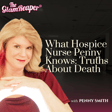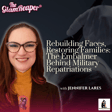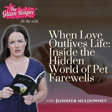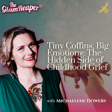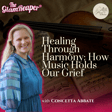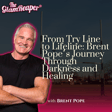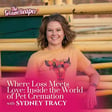
Healing in the Hardest Places: End-of-Life Care Inside Prison
In this episode of The Glam Reaper Podcast, Jennifer Muldowney sits down with Laura Musselman of the Humane Prison Hospice Project to explore the often unseen world of end-of-life care behind bars. Through a powerful and deeply personal conversation, Laura shares how her journey through loss and grief led her to support incarcerated caregivers offering dignity to fellow inmates in their final days.
The episode uncovers the human side of prison life that many overlook, where empathy, purpose, and community still thrive in the harshest environments. Laura and Jennifer reflect on the complexities of compassion, the weight of judgment, and why every person, regardless of their past, deserves to be seen and cared for.
See also Jennifer’s previous blog on the topic here https://www.theglamreaper.com/2025/03/a-life-sentence-is-death-sentencejust.html
This conversation is a reminder that even in the most difficult circumstances, people are capable of profound kindness, and when given the chance, community gathers and they will rise to care for one another.
Key Topics:
-Finding purpose through grief and personal loss
-The power of compassion behind prison walls
-Honoring dignity and care at the end of life
-Seeing the human beyond the sentence
-How healing begins when we choose to care
Timestamp:
[00:00] Podcast Intro
[00:46] Laura shared with Jen how personal loss and a calling to support life transitions drew her from teaching into end-of-life care in prisons, where she now works to restore dignity for aging and terminally ill inmates often forgotten by society.
[07:09] She challenged the idea that care must be earned, telling Jen that compassion isn’t a prize, it’s a reflection of our shared humanity and the kind of society we want to be.
[11:25] Laura emphasized that every person, even those behind bars, carries a story shaped by life experience, not just a sentence, and that offering care shouldn't depend on someone’s perceived worth.
[17:22] She reflected on witnessing deep empathy in the most unlikely places, reminding Jen that healing and purpose can thrive even in the darkest corners, if we allow space for it.
[25:30] Laura explained how her team listens to each prison specific needs, training incarcerated peers with trauma-informed skills to provide compassionate care for fellow inmates facing aging, dementia, or death.
[32:05] She described the trust-based, peer-led programs that bring meaning, responsibility, and connection to both caregivers and those nearing life’s end, proof that humanity doesn’t stop at prison walls.
[38:59] Outro
Check out a blog post on this also: https://www.theglamreaper.com/2025/03/a-life-sentence-is-death-sentencejust.html
Connect with Laura Musselman:
LinkedIn- linkedin.com/in/laura-musselman-3aa42174
Website - humaneprisonhospiceproject.org
Connect with Jennifer/The Glam Reaper on socials at:
Instagram - https://www.instagram.com/jennifermuldowney/
TikTok - https://www.tiktok.com/@therealglamreaper
YouTube - https://www.youtube.com/@TheGlamReaperMuldowney
LinkedIn - https://www.linkedin.com/in/jennifermuldowney/
Facebook Page - https://www.facebook.com/MuldowneyMemorials/
Email us - glamreaperpodcast@gmail.com
Shop Merch - https://the-glam-reaper.printify.me/products
Listen to The Glam Reaper Podcast on Apple Podcasts: https://podcasts.apple.com/us/podcast/the-glam-reaper-podcast/id1572382989?i=1000525524145
The Glam Reaper® AMAZON Storefront - https://amzn.to/4hObpOh

